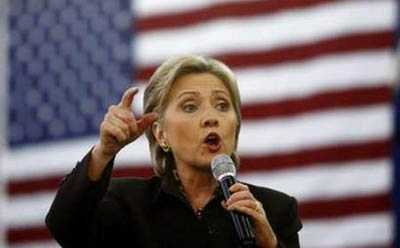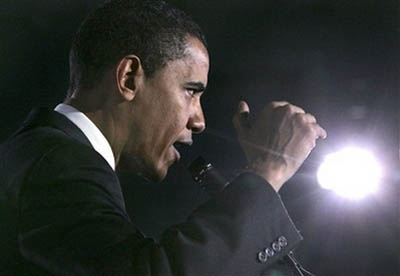Battling for every dollar and delegate, Barack Obama raised $7.2 million in Super Tuesday's wake and Hillary Rodham Clinton pulled in $6.4 million, stunning totals reflecting the intensity of their neck-and-neck race for the Democratic presidential nomination.
Democratic presidential candidate US Senator Hillary Clinton (D-NY) speaks at a campaign rally at Washington Lee High School in Arlington, Virginia, February 7, 2008.
Keenly aware of Obama's growing strength, Clinton challenged him to five debates in the next month. Obama put her off.
"We'll have some debates," Obama promised. But first, he said, "I've got to spend time with voters." Clinton, he argued, is better-known to voters in states coming up on the primary calendar.
Clinton, who loaned her campaign $5 million in the run-up to Super Tuesday, brushed aside the notion she has money problems. She pointed to the roughly even split of delegates still being allocated from Tuesday's primaries and caucuses as evidence her campaign has the financial muscle to compete.
"We're going to be fine," said Clinton. "By the end of the week, we'll be back on track," she told ABC.
Top Clinton advisers offered to work without pay, but that wasn't necessary with the sudden influx of cash.
National campaign chairman Terry McAuliffe, in a conference call with 300 Clinton fundraisers nationwide, assured them: "All staff 100 percent paid. Not an issue."
Indeed, whatever the current balance in the money chase, both candidates have been raising and spending incredible sums.
Each raised $100 million last year and sped through at least $80 million. That compared to $128 million raised by all the Democratic candidates combined during 2003, the comparable period four years ago. President Bush, running uncontested, pulled in $129 million of his own that year.
Any financial crunch for Clinton would be largely due to lopsided fundraising in January, when Obama pulled in $32 million to her $13.5 million.
"Obama was able to do what no one thought possible, which is to finance Super Tuesday," said Anthony Corrado, a campaign finance expert at Colby College in Maine. "He was able to advertise in more states, went on TV earlier in more states and put more resources into ground efforts in most of these states."
Looking ahead, Corrado said, the question for Clinton is whether she will have the cash needed for expensive advertising campaigns in upcoming contests including Ohio, Wisconsin and Texas.
"Obama's donor base continues to expand, so it's doubtful that she is going to be able to catch up," Corrado said, calling Obama an "unexpected financial colossus."
Clinton, as a former first lady, has had the advantage of better name recognition; Obama's recent financial advantage has helped him overcome that familiarity gap.
Democratic presidential hopeful, Sen. Barack Obama, D-Ill., addresses supporters during a community gathering at Tulane University Thursday, Feb. 7, 2008, in New Orleans.
Obama, asked about Clinton's recent personal loan to her campaign, said it showed "she has not generated the kind of grass-roots enthusiasm that we have."
He's confident enough of his standing now to be choosy in the debate over debates.
Clinton campaign manager Patti Solis Doyle on Thursday sent the Obama camp a proposal for five one-on-one debates before the March 4 round of primaries in Ohio, Texas, Rhode Island and Vermont.
"I'm sure we can find a suitable place to meet on the campaign trail," Solis Doyle wrote. "There's too much at stake and the issues facing the country are too grave to deny voters the opportunity to see the candidates up close."
Buoyed by a primary calendar in February that plays to his strengths, Obama plans a campaign swing through states holding contests this weekend, and will compete to win primaries in Virginia, Maryland and the District of Columbia next week and Hawaii and Wisconsin the following week.
Clinton is concentrating more on March 4 contests in Ohio and Texas, where polling shows her with a significant lead. She even is looking ahead to Pennsylvania's primary on April 22.
Obama, campaigned in New Orleans on Thursday, offering himself as the best candidate to restore competence to the White House and rebuild trust broken by the government's botched response to Hurricane Katrina.
Speaking at Tulane University ahead of Saturday's Louisiana primary, the Illinois senator accused Bush of failing to do enough to help the Gulf Coast recover from the devastating storm of August 2005. He proposed a multifaceted program for the area, but did not indicate its total cost or how he would pay for it.
"When I am president," Obama told about 4,000 people in Tulane's basketball arena, "we will finish building a system of levees that can withstand a 100-year storm by 2011, with the goal of expanding that protection to defend against a Category 5 storm."
With Sen. John McCain now virtually certain to be the Republican nominee - Mitt Romney dropped out Thursday - Obama said that he is the better Democrat to challenge the Arizonan in the general election.
Democrats should "think about who matches up best against John McCain," Obama told reporters during a flight from New Orleans to Nebraska.
"I would be in a stronger position to have a discussion about how we're going to reform Washington against John McCain, given that I don't take PAC money, I don't take federal lobbyists' money, I've been a champion on these issues," Obama said. "I think Senator Clinton would have a harder time making some of those arguments."
The Clinton campaign has noted that Obama does take donations from people who lobby at the state level, and it says she would bring important reforms to Washington.
Clinton campaigned Thursday in Virginia, which will be part of Tuesday's mid-Atlantic voting, then moved on to Washington state, which votes Saturday.
"I have the greatest respect for my friend and colleague, Senator McCain, but I think he offers more of the same," she said. "He said recently he could see having troops in Iraq for 100 years. I want them to begin to come home in 60 days."
Clinton also unveiled a new 30-second that features a testimonial from former Nebraska Sen. Bob Kerrey, who urged voters to attend Saturday's caucuses and support the former first lady. "She'll never let you down," he says.
Michael Malbin, executive director of the Campaign Finance Institute, cautioned against making too much of who's ahead in the money chase.
"They both have lots of money," Malbin said. "We've been a little too quick to look at who has somewhat more and who has somewhat less and think that automatically equates to who has more votes or who will get more votes."
As for Clinton, Malbin said, "she did have to lend herself $5 million. So did John Kerry, and it worked. John McCain had to borrow money, and it worked for him too."
Clinton's national finance co-chairman Alan Patricof said Thursday that fundraisers were targeting thousands of potential high donors nationally who had not yet given the maximum donation of $2,300 to spend in the primary season. He also said Clinton planned to return to New York before the end of February to attend a major fundraising gala.
Obama's campaign stressed his success with small donors: So far in 2008, 135,000 people have given $25 or less over the Internet. More than two-thirds of his online contributors this year 2008 are new donors.
(China Daily/Agencies February 8, 2008)



